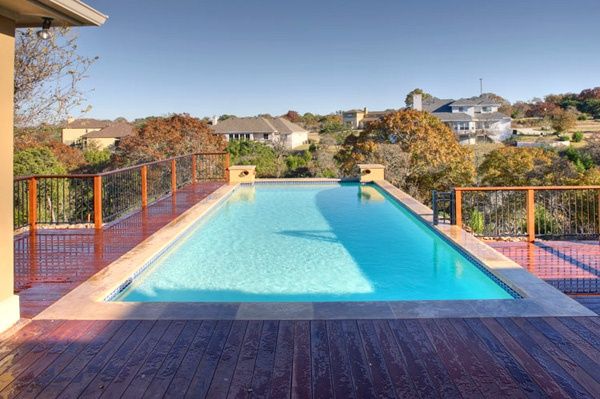
Concrete vs Gunite Pools: Which One Is Right for You?
When it comes to installing a swimming pool, the materials you choose play a significant role in determining its longevity, aesthetics, and maintenance needs. Two of the most popular options are concrete and gunite.
While they may seem similar at first glance, each material has its own unique qualities that make it better suited for certain situations. As professional pool builders in Taylor, TX with decades of experience, we’ll dive into the differences between concrete and gunite pools to help you make an informed decision.
Understanding Concrete and Gunite Pools
Before exploring their differences, let’s define what concrete and gunite pools are. Both are made from concrete, but the way they are constructed sets them apart.
Concrete pools are built by pouring ready-mix concrete into wooden or metal forms that shape the pool. On the other hand, gunite pools are constructed by spraying a dry concrete mixture combined with water onto a rebar framework using a specialized spray gun. This difference in application affects factors such as strength, flexibility, and overall performance.
Advantages of Concrete Pools
Concrete pools have been a staple in backyard design for decades. Here’s why they continue to be a popular choice:
- Superior Strength: Concrete pools are incredibly durable, withstanding heavy use and extreme weather conditions.
- Custom Shapes: Since concrete is poured into forms, you have unlimited options for creating unique shapes, sizes, and designs.
- Long Lifespan: A well-maintained concrete pool can last for decades, making it a worthwhile investment.
- Tiled Surfaces: Concrete pools often feature beautiful, fully tiled surfaces that give a luxurious, high-end look.
Despite these benefits, concrete pools require considerable time for installation, as the concrete needs to cure properly to ensure strength and durability.
Advantages of Gunite Pools
Gunite pools are the go-to choice for many pool builders because of their adaptability and ease of construction. Here are some of their standout features:
- Versatility in Design: Gunite pools allow for creative designs, including freeform shapes, infinity edges, and custom features like tanning ledges.
- Faster Construction: The sprayed application of gunite speeds up the building process compared to traditional concrete.
- Seamless Integration: Gunite can easily accommodate additional features, such as waterfalls, spas, and custom benches.
- Strong and Flexible: Gunite’s application process creates a solid, yet slightly flexible structure, reducing the risk of cracking over time.
While gunite pools offer many advantages, they do require a layer of plaster to create a smooth surface. This plaster will need to be replaced every 7–15 years, depending on usage and maintenance.
Key Differences Between Concrete vs Gunite Pools
To make the right decision, it’s essential to understand how concrete and gunite pools differ in several critical aspects:
Construction Process:
- Concrete pools are poured and cured, taking longer to build.
- Gunite pools are sprayed, allowing for quicker installation.
Durability:
- Concrete pools are highly durable but may be prone to cracking over time if not installed properly.
- Gunite pools are equally strong and less likely to develop structural cracks due to their flexible application.
Customization:
- Both offer excellent customization options, but gunite is slightly better for complex designs and additional features.
Maintenance:
- Concrete pools require regular sealing to prevent damage.
- Gunite pools need periodic plaster resurfacing.
Cost:
- Both options are considered premium, but the cost can vary depending on size, design complexity, and local labor rates.
Which Pool Should You Choose?
The decision between concrete and gunite ultimately comes down to your priorities. If you value long-term durability and are willing to wait for the construction process, a concrete pool could be the best fit for your needs. However, if you want a highly customizable pool with quicker installation, gunite may be the better choice.
Consider factors like your budget, timeline, design preferences, and willingness to maintain your pool. Consulting with an experienced pool contractor can also help clarify which option aligns with your vision.
Conclusion
Both concrete and gunite pools offer exceptional quality and customization, making them excellent choices for backyard swimming pools. By understanding the key differences and advantages of each, you can confidently choose the one that meets your needs and lifestyle. Whether you go with the timeless strength of concrete or the design versatility of gunite, you’ll end up with a pool that enhances your outdoor living space and creates a personal oasis for years to come as long as you hire the best pool builders in Taylor, TX for your project.
